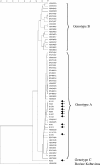Prevalence and genetic diversity of Aichi virus strains in stool samples from community and hospitalized patients
- PMID: 18256215
- PMCID: PMC2292896
- DOI: 10.1128/JCM.02140-07
Prevalence and genetic diversity of Aichi virus strains in stool samples from community and hospitalized patients
Abstract
Aichi virus has been proposed as a causative agent of gastroenteritis. A total of 457 stool specimens from children hospitalized with acute diarrhea and 566 stool specimens from adults and children involved in 110 gastroenteritis outbreaks were screened for the presence of Aichi virus by reverse transcription-PCR (RT-PCR) amplification of the genomic region of the 3C and 3D (3CD) nonstructural proteins. Our results show a low incidence of Aichi virus in pediatric samples and the existence of mixed infections with other microbiological agents in some cases. From the outbreak survey, it appears that the presence of Aichi virus is an indicator of mixed infections causing gastroenteritis outbreaks and that it could be involved in half of the oyster-associated outbreaks. A second RT-PCR was developed to amplify a part of the VP1 gene. The phylogenetic analysis showed a good correlation between the two classifications based on 3CD and VP1 gene sequences and revealed the prevalence of genotype A in France. It also allowed us to partially describe an Aichi virus strain that could represent a new genotype, thus suggesting the existence of a certain diversity.
Figures



References
-
- Glass, R. I., J. Bresee, B. Jiang, J. Gentsch, T. Ando, R. Fankhauser, J. Noel, U. Parashar, B. Rosen, and S. S. Monroe. 2001. Gastroenteritis virus: an overview. Novartis Found. Symp. 2385-19. - PubMed
Publication types
MeSH terms
Associated data
- Actions
- Actions
- Actions
- Actions
- Actions
- Actions
- Actions
- Actions
- Actions
- Actions
- Actions
- Actions
- Actions
- Actions
- Actions
- Actions
- Actions
- Actions
- Actions
- Actions
LinkOut - more resources
Full Text Sources
Other Literature Sources
Medical

